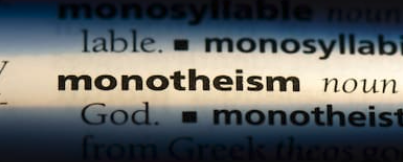
Beyond the common belief in one god, one has to examine the content of that belief, philosophically, because not all similar beliefs are identical and similar beliefs may command varying degrees of credibility based on details. The monotheism of the ancient Egyptians was radically different in content from that of the Old Testament.
In a symposium on ‘Aspects of Monotheism’ at the Smithsonian Institution on October 19, 1996, the foremost authority on Akhenaten, Donald Redford, along with three other specialists, William Dever, P. Kyle McCarter and John J. Collins presented papers and together faced the audience in a Q & A session. Several versions of questions were asked about the links between Egyptian and Israelite monotheism. Redford’s answer to one such question is quite instructive and he had agreement from Dever.
Q: In your judgment, did Egyptian one-godism influence early Israelite theology?
Redford: Well, if you mean Akhenaten, I don’t think it did at all. There is the fact that the traditional monotheism of Moses speaks of one god and Akhenaten makes it clear that he is dealing with a single god. But Egypt in the Iron Age and later, when Israel and Judah were coming into contact with it, was noted for the multiplicity of deities. Egypt was anything but monotheistic during the Iron Age. Moreover, the monotheism of Akhenaten is so distinct from Yahwism that I wonder why the two are compared. Really, there’s very little to Akhenaten’s religion. It’s been pointed out, for example, that Akhenaten’s religion is devoid of ethical content; in Mosaic monotheism, the ethical content is quite extensive. No, I don’t see any link. (Hershel Shanks, et al, eds., Aspects of Monotheism: How God is One (1997), 113-114).
There is an acute and fundamental philosophical difference between the monotheism of the Bible and that of the Egyptians, including Akhenaten. The God-creator of the Bible is infinite and a person whereas that of the Egyptians in general and Akhenaten in particular, was the sun or matter.
The philosophical difference is that biblical monotheism wields explanatory scope and power re the origin of anything/everything including persons and mind because God is infinite and personal whereas Egyptian concepts of god and Akhenaten’s monotheism lack it because a contingent, material entity, the sun or matter, is giving rise to everything including persons and mind.
This is a neglected problem for any alleged theory of stealing, borrowing or influence concerning Egyptian concepts of deity and the biblical one. It is of philosophical note too that in spell 15 of the Book of Going Forth by Day (or the Book of the Dead) the sun is hailed as the sole deity and as coming into being in time.
“Hail to you, O Re at your rising, O Atum-Horakhty . . . the Unwearying Stars acclaim you, the Imperishable Stars worship you when you set in the horizon of Manu . . . the Sole One came into existence in the sky before the plains and the mountains existed . . . “ (See the translation in James Wasserman, The Egyptian Book of the Dead, 1998, plate 18)
The book of Genesis (1.1) opens with the words “In the beginning God created the heavens and the earth” including the celestial bodies and the New Testament, in several places, declares “ . . . that a transcendent Being created the cosmos, One who operates in a reality beyond our matter, energy, space, and time.”(Hugh Ross, Beyond the Cosmos: What Recent Discoveries in Astronomy and Physics Reveal About the Nature of God, 1996, 42)
God is said to have made decisions “before the beginning of time” (2 Tim. 1.2; Titus 1.2) or “before the world began” (John 17.2, 24; Eph. 1.4; 1 Pet. 1.20).
Note as well the popularity of pictorial and carved depictions of deity in Egyptian sources and the central taboo on graven images of Yahweh in the allegedly borrowed or stolen Ten Commandments. Exodus 20.4-5 says, “You shall not make for yourself an idol, or any likeness of what is in heaven above or on the earth beneath or in the water under the earth. You shall not worship them or serve them . . .” (New American Standard Bible).
At times, serious researchers must examine not only the forest but a few trees therein. This is what critical reading/thinking demands!
Rev. Clinton Chisholm former lecturer in Greek at JTS and CGST, is author of the recent book A Controversial Clergyman: Provocative Newspaper Articles to Foster Critical Thinking…
